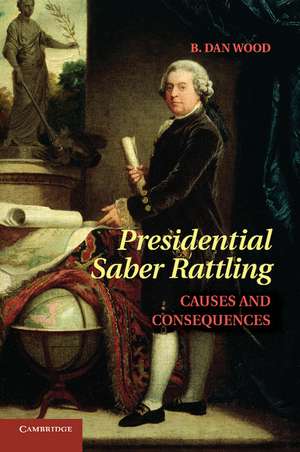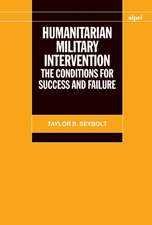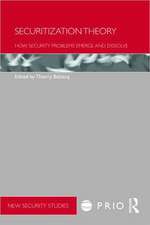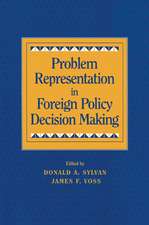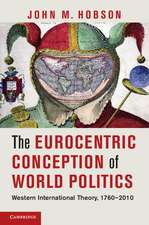Presidential Saber Rattling: Causes and Consequences
Autor B. Dan Wooden Limba Engleză Paperback – 5 mar 2014
| Toate formatele și edițiile | Preț | Express |
|---|---|---|
| Paperback (1) | 281.88 lei 6-8 săpt. | |
| Cambridge University Press – 5 mar 2014 | 281.88 lei 6-8 săpt. | |
| Hardback (1) | 689.09 lei 6-8 săpt. | |
| Cambridge University Press – 26 aug 2012 | 689.09 lei 6-8 săpt. |
Preț: 281.88 lei
Nou
Puncte Express: 423
Preț estimativ în valută:
53.95€ • 58.63$ • 45.35£
53.95€ • 58.63$ • 45.35£
Carte tipărită la comandă
Livrare economică 21 aprilie-05 mai
Preluare comenzi: 021 569.72.76
Specificații
ISBN-13: 9781107661905
ISBN-10: 1107661900
Pagini: 210
Ilustrații: 25 b/w illus. 12 tables
Dimensiuni: 152 x 229 x 12 mm
Greutate: 0.31 kg
Editura: Cambridge University Press
Colecția Cambridge University Press
Locul publicării:New York, United States
ISBN-10: 1107661900
Pagini: 210
Ilustrații: 25 b/w illus. 12 tables
Dimensiuni: 152 x 229 x 12 mm
Greutate: 0.31 kg
Editura: Cambridge University Press
Colecția Cambridge University Press
Locul publicării:New York, United States
Cuprins
1. Presidential saber rattling in the early American republic; 2. Presidential saber rattling and presidential representation; 3. Measuring presidential saber rattling; 4. The causes of presidential saber rattling; 5. The domestic consequences of presidential saber rattling; 6. The foreign policy consequences of presidential saber rattling; 7. The Bush war on terror and presidential foreign policy representation; 8. Wisdom, virtue, and presidential foreign policy representation.
Recenzii
'Students of the presidency have given immense attention to presidential public rhetoric and presidents going public, but rarely have studied a president's foreign policy rhetoric. B. Dan Wood, one of our most respected presidency scholars, does so in Presidential Saber Rattling. Not only does Wood develop the concept of presidential saber rattling, but he meticulously collects and analyzes more than 50 years of such presidential rhetoric. And he reminds us that saber rattling is an important form of presidential policy making. [This book] is destined to become a classic and to stimulate future research.' Jeffrey E. Cohen, author of The President's Legislative Policy Agenda, 1789–2002
'Rich in historical case studies and data analyses, Presidential Saber Rattling casts new light on the reasons presidents use bellicose foreign policy rhetoric and on the consequences of such rhetoric domestically and internationally. This book will be essential reading for students of American politics and United States foreign policy.' John R. Freeman, University of Minnesota
'This book tackles the big questions of the causes and consequences of presidential saber rattling. It introduces impressive new data and careful analysis to provide [a] terrific new insight into this aspect of presidential decision making.' David E. Lewis, Vanderbilt University
'Presidential Saber Rattling makes important contributions to literatures on both democratic representation and the role of domestic politics in military policy making. It also opens many doors for future research at the intersection of American politics and international relations scholarship.' Douglas Kriner, Congress and the Presidency
'Rich in historical case studies and data analyses, Presidential Saber Rattling casts new light on the reasons presidents use bellicose foreign policy rhetoric and on the consequences of such rhetoric domestically and internationally. This book will be essential reading for students of American politics and United States foreign policy.' John R. Freeman, University of Minnesota
'This book tackles the big questions of the causes and consequences of presidential saber rattling. It introduces impressive new data and careful analysis to provide [a] terrific new insight into this aspect of presidential decision making.' David E. Lewis, Vanderbilt University
'Presidential Saber Rattling makes important contributions to literatures on both democratic representation and the role of domestic politics in military policy making. It also opens many doors for future research at the intersection of American politics and international relations scholarship.' Douglas Kriner, Congress and the Presidency
Notă biografică
Descriere
Evaluates the causes and consequences of presidential threats toward other nations, revealing the nature of modern presidential foreign policy representation.
